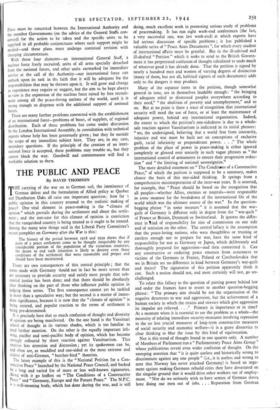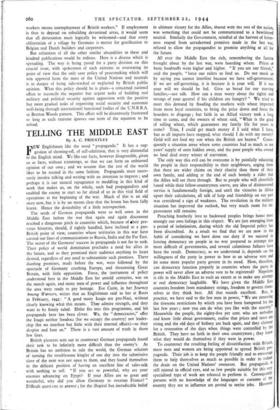THE PUBLIC AND PEACE
By DAVID THOMSON
THE carrying of the war on to German soil, the imminence of German defeat and the formulation of Allied policy at Quebec and Dumbarton Oaks all raise one important question : how far 's public opinion in this country attuned to the realistic making of peace? One vital element in peace-making is the "climate of opinion " which prevails during the settlement and about the settle- ment ; and the test-case for this climate of opinion is conviction that the vanquished country is being treated as it ought to be treated.
Among the many wise things said in the Liberal Party Committee's recent pamphlet on Germany after the War is this:
The history of the period between 1918 and 1939 shows that if parts of a peace settlement come to be thought inequitable by any considerable portion of the population of the victorious countries, the desire to end such injustices is likely to destroy even those conditions of the settlement that were reasonable and proper and should have been maintained.
There are two consequences of this central principle ; that the terms made with Germany lhould not in fact be more severe than are necessary to provide -security and satisfy most people that sub- stantial justice has been done; and that there should be absolutely clear thinking on the part of those who influence public opinion in judging these terms. The first consequence cannot yet be tackled in more than a speculative way; but the second is a matter of imme- diate significance, because it is now that the " climate of opinion " is being created, and popular reaction to the terms of settlement is
being pre-determined.
It is precisely here that so much confusion of thought and diversity
of opinion are being manifested. On the one hand is the Vansittart school of thought in its various shades, which is too familiar to need further mention. On the other is the equally important left- wing, pacifist and semi-pacifist body of opinion, which has become strongly coloured by sheer_ reaction against Vansittartism. This receives less attention and discussion ; yet its spokesmen can be, and often are, as muddled and one-sided as the most extreme and violent of anti-German, " butcher-bird " theorists. The latest example of this is the "National Petition for a Con- structive Peace " launched by the National Peace Council, and backed by a long and varied list of more or less well-known signatories. Along with it go leaflets on " The Conditions of a Constructive Peace " and " Germany, Europe and the Future Peace." The N.P.C. is a well-meaning body, which has done during the war, and is still
doing, much excellent work in promoting serious study of problems of peacemaking. It has run eight week-end conferences (the last, a very successful one, was last week-end) at which experts have led serious discussion of specific problems ; it has published a valuable series of " Peace Aims Documents ", for which every student of international affairs must be grateful. But in the ill-advised and ill-drafted " Petition " which it seeks to send to the British Govern- ment it has perpetrated confusion of thought calculated to undo much of whatever good it has already done. That the petition is signed by nearly a hundred men and women of varying degrees of distinction (many of them, but not all, habitual signers of such documents) adds only to the dangers it may produce.
Many of the separate items in the petition, though somewhat general in tone, are in themselves laudable enough : " the bringing of adequate relief to distressed peoples everywhere according to their need," " the abolition of poverty and unemployment," and so on. But at no point is there a trace of recognition that international security will need the use of force, or at least the maintenance of adequate power, behind any international organisation. Indeed, the extent to which the petition's one-sidedness is due to a whole- sale reaction against Vansittartism is indicated in its initial phrases: " we, the undersigned, believing that a world free from insecurity, injustice and war must be built not on conceptions of exclusive guilt, racial inferiority or preponderant power. . . ." The whole problem of the place of power in peace-making is either ignored completely or glossed over uneasily in such vague phrases as " the international control of armaments to ensure their progressive reduc- tion " and " the limiting of national sovereignties."
The more detailed statement on " The Conditions of a Constructive Peace," of which the petition is supposed to be a summary, makes clearer the basis of this one-sided thinking. It springs from a comprehensive misinterpretation of the inter-war years. It is asserted, for example, that " Peace should be based on the recognition that all peoples—whether Allies, enemies or neutrals—were responsible in some measure for the breakdown of the international life of the world which was the ultimate source of the war." In the question- begging phrase " in some measure " it is assumed that the war- guilt of Germany is different only in degree from the " war-guilt " of France or Britain, Denmark or Switzerland. It ignores the differ- ence in tind of responsibility for sins of commission on one side and of omission on the other. The central fallacy is the assumption that the peace-loving nations, who were thoughtless or trusting or careless enough not to prepare for war, have the same kind of responsibility for war as Germany or Japan, which deliberately and thoroughly prepared for aggression—and then committed it. Can any constructive or enduring peace emanate from assurances to victims of the Germans in France, Poland or Czechoslovakia that we in Britain see no difference in kind between Germany's war-guilt and theirs? The signatories of this petition apparently think it can. Such a notion should not, and most certainly will not, go un- challenged.
To relate this fallacy to the question of putting power behind law and order the framers have to resort to another question-begging phrase: " The primary aim should be not the organisation of the negative deterrents to war and aggression, but the achievement of a human society in which the strains and stresses which give aggression its impulse are relieved. . . ." Primary in importance or in time? At a moment when it is essential to see the problem as a whole—the necessity of relating immediate security-measures involving repression to the no less crucial measures of long-term constructive measures of social security and economic welfare—it is a grave disservice to clear thinking to blur the issue by this kind of equivocation.
Nor is this trend of thought found in one quarter only. A number of Members of Parliament run a " Parliamentary Peace Aims Group " whose publications reveal even wider confusion of thought. On the sweeping assertion that " it is quite useless and historically wrong to discriminate against any one people " (i.e., it is useless and wrong to note that Norway has never attacked Germany) is based an argu- ment against making Germans rebuild cities they have devastated on the singular ground that it would drive other workers out of employ- ment. " Nor do we seriously wish to have armies of German slaves here doing our men out of jobs. . . . Reparation from German workers means unemployment of British workers." If employment is thus to depend on rebuilding devastated areas, it would seem that all devastation must logically be welcomed—and that every obliteration of a village by Germans is matter for gratification to Belgian and Dutch builders and carpenters.
But refutation of all the other similar absurdities in these and kindred publications would be tedious. Here is a disease which is spreading. The way is being paved for a party division on this crucial issue, with spokesmen of each extreme so overstating its point of view that the only sane policy of peacemaking which will win approval from the mass of the United Nations and neutrals is in danger of being side-tracked or neglected by British public opinion. What this policy should be is plain—a concerted national effort to reconcile the negative but urgent tasks of building real military and political security against aggression with the positive but more gradual tasks of organising social security and economic well-being through international functional bodies of the U.N.R.R.A. or Bretton Woods pattern. This effort will be disastrously frustrated so long as each extreme ignores one term of the equation to be solved.



























 Previous page
Previous page